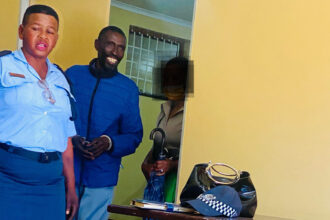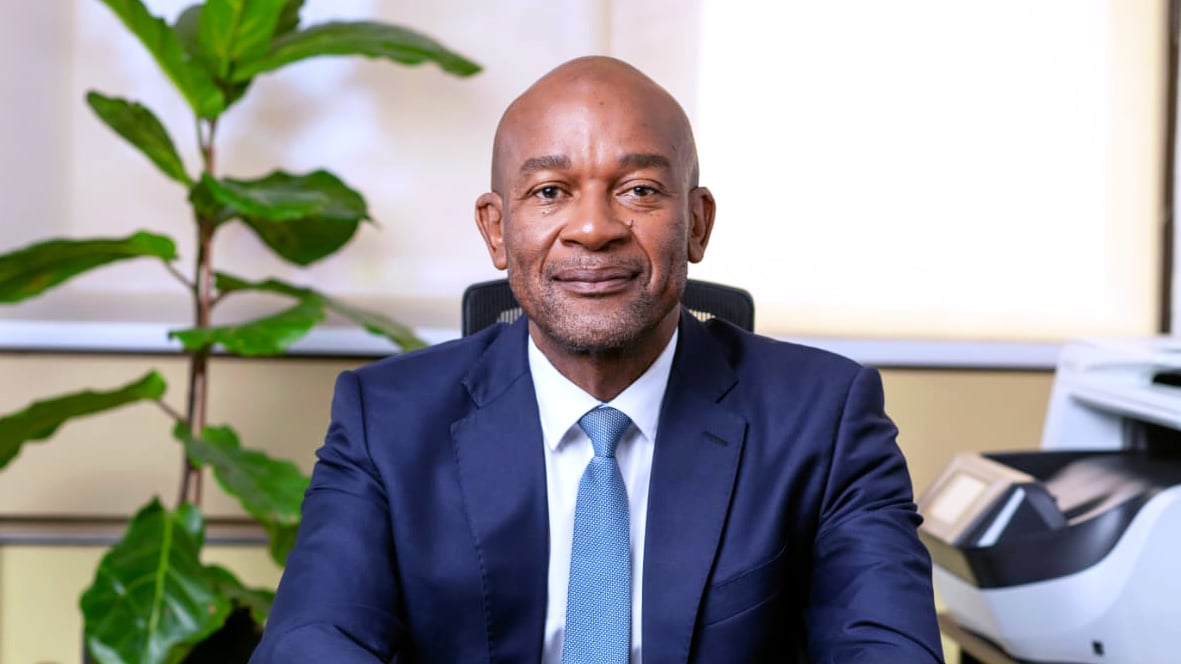Talking WUC and water with the boss
Of late, Water Utilities Corporation (WUC) has been hoarding the headlines for all the right reasons, flooding the news with its robust multi-billion Pula projects aimed at taking water to the people.
In this week’s Meet the Boss, we chat to WUC Chief Executive Officer (CEO), Gaselemogwe Senai, to find out exactly what the corporation is doing to ‘keep it flowing’ for Batswana.
Boasting over 30 years experience in the water sector, Senai was appointed acting CEO of WUC on 1st June, 2019 before assuming the role full-time in June 2020.
Having joined the government-owned organisation in 1993, Senai rose through the ranks of technical, supervisory, managerial, executive departments before ascending to the top position.
Let’s meet the water warrior…
Can you provide an overview of the recent water projects undertaken by the corporation?
We are undertaking over 30 projects, most of which are expected to be completed this year.
The overall objective is to provide bulk water infrastructure such as Water Treatment Plants, Pump Stations, Water Tanks or Reservoirs and pipelines.
All these are strategically constructed from water sources to bring water closer to the people in various locations.
Following these, work to upgrade internal network will commence.
Roughly how much water does the nation use in a day?
Botswana’s national demand is 363 million litres per day against supply of 310 million litres per day.
This translates to 17 percent national average deficit and further means, as a country, we will have incidents of no water at some point, something we work hard to minimise by providing a strategic water balance.
What measures are the corporation taking to address this deficit?
Some areas are affected most than others.
In some areas, we ration. Currently, we have about 39 villages with adverse water shortage. to provide mitigation, we are providing bowsing.
Sticking with this theme, despite being connected to the NSC, residents in Kanye, Molepolole, Thamaga and Ramotswa regularly complain of having no water – what’s the problem there?
The villages stated have high lying areas, which tend to experience low to no pressure.
Some, like Molepolole and Kanye, have an old network that can burst anytime from water with high pressure.
Ramotswa is on the Lobatse corridor, which gets water from Gaborone and gets affected when we experience challenges in Gaborone water sources or when there are pipe bursts.
What long-term plans does WUC have for water infrastructure development and maintenance in Botswana?
We continuously follow the National Water Plan, which began with constructing water sources such as dams, now transmission lines and associated pump stations and local reservoirs.
The next phase is to rehabilitate our network.
These infrastructure projects are built with factors such as population growth in mind.
Some of the projects we are completing this year will take up to 20 years or more supplying residents with water.
In terms of climatic change, we recognise that water in our dams can evaporate and therefore implement conjunctive supply practice where we use more water from dams while reserving groundwater sources for critical times unless the sources are the main source of supply.
We also monitor our groundwater source operation to ensure longevity of their lifespan.
How much is the total domestic debt from water users?
Our domestic debt sits over a billion Pula because the debt is revolving.
As water gets used daily, debt builds up. We have provided various channels through which customers can settle their bills and prevent debt.
Beyond that, we engage individuals directly to ensure that the debt is settled, further disconnecting services where there is no response – the latter being our last resort!
Customers sometimes complain of high billing from WUC despite using small amounts of water, why does that happen and are you aware of such complaints?
We take customer complaints seriously. That’s why we conduct immediate investigations when complaints reach us and take necessary actions.
Water leakages are also a concern; how often does WUC inspect its pipes for maintenance?
Our teams are always monitoring our water systems to find any indication of leakages.
When there is a major leak, water may not reach certain locations despite being distributed.
This is where we need strong collaboration with water users to report any anomaly on water distribution, including incidents of bursts and leaks.
There were talks of introducing pre-paid smart meters for water users, but that appears to have fallen through?
We are always exploring better ways to serve our customers.
We have taken some water meters outside in areas such as Block 7 and Phakalane for ease of reading.
We also looked into smart metering and are now looking into prepaid system.
Once we are satisfied with each system and they are approved, we will engage our stakeholder, then roll it out in phases to different customers.
Much focus has been on taking water to people through major projects, in terms of rehabilitation of the distribution networks. Are there any milestones to report?
Molepolole and Kanye are two major villages with very old and dilapidated water infrastructure network.
Rehabilitation of infrastructure has begun in the two villages.
The good news is that water is already reaching them both through the major infrastructure.
So, once the network rehabilitation is complete, water will seamlessly flow into the homes of water users.
Can you report any progress on drawing water from Chobe/Zambezi River, Walvis Bay seawater desalination and sourcing water from Lesotho projects?
For Chobe/Zambezi, feasibility Study has been done and plans are in place to find partners through Public Private Partnership (PPP) model while for Walvis Bay works are ongoing to undertake a Feasibility Study for the project.
For Lesotho Highlands, water scheme is undertaken by the Department of Water and Sanitation.
I understand vandalism of WUC’s boreholes – especially people stealing cables from them – is a growing problem. What are you doing to combat this?
We have enhanced security around our infrastructure by adding more cameras and sensors.
We have further engaged the law enforcement agencies and security organs such as the BDF, Botswana Police and DIS to help us fight criminals.
It’s a pity some of the culprits are children who come from homes, so chances are that some parents are housing stolen goods.
Some stolen goods such as cables find their way to some scrap yards calling for a national position on what goes in and out of such business undertakings.
We are also appealing to Batswana to join the war against water infrastructure vandalism.
Every loss affects all of us hence the need to work together to protect the resource by safeguarding the infrastructure.
What other challenges hinder WUC from delivering on its mandate?
Our greatest enemy now is vandalism of infrastructure.
This past year, we saw water chambers being vandalised in Maitengwe, Palapye-Serowe, Ramotswa, Molepolole, Mmamashia-Oodi, and along the North South Carrier (NSC).
We are also seeing some people breaking the pipelines for the purpose of watering livestock, also common along the NSC pipeline.
Cattle gather around the areas where this water from water infrastructure is visible.
In the case of Masama boreholes, culprits target high yielding boreholes, which compels us to take them offline.
Sadly, big villages like Kanye, once supply has been disrupted, it takes days to build up again.
The other factor to consider is that water supply is an expensive undertaking, generally, and needs big funding to be able to accomplish more.
That’s why in some areas and projects, we invite private sector participation.
With demand for water growing every year and lack of suitable dam sites in the country, where does this put us as country?
We are consistently monitoring population growth and water usage.
The National Water Master Plan exists solely for this purpose.
So, we are aware of the usage patterns and have plans in place to avail water for the nation.
Some plans include the current water infrastructure undertaking that will see more water drawn from the north where there are more rains.
Others include taking water from Chobe-Zambezi, Lesotho and Namibia.
Unfortunately, as a country, we have exhausted all areas where dams can be constructed.
How does the corporation ensure transparency and accountability in its operations, especially in light of concerns about corruption in the water sector?
Our operations are guided by ministry, board, policies and national governing instruments.
By aligning with them, and further engaging the public through our stakeholder management programmes, we are sure that our work is there for everyone to see.
Even myself as the accounting officer, I am always ready to engage.
Next month marks four years since you assumed the CEO role on a full-time basis. Given the high turnover of CEOs that came before you, what do you attribute your longevity to?
All leaders leave a footprint and my predecessors did the same. They led WUC at different times under different circumstances. I have built on what they left.
It takes bringing financial, operational and social factors to manage a service entity such as WUC and see it afloat.
We will therefore continue to develop and implement strategies that align with requirements of this season, that include the national agenda, to see water reaching Batswana and the corporation remaining strong to keep it flowing.
What kind of legacy do you want to leave at WUC?
I want to be remembered for having had the audacity to lead the biggest parastatal in Botswana, something that challenged me to develop talents and tenacity I never knew I had.
Water is a basic service and leading its operations makes you a servant of the people as you must be available all the time.
It is only passion and love for the people we serve that keeps me going.
I therefore want to be remembered as a leader with passion for service.








